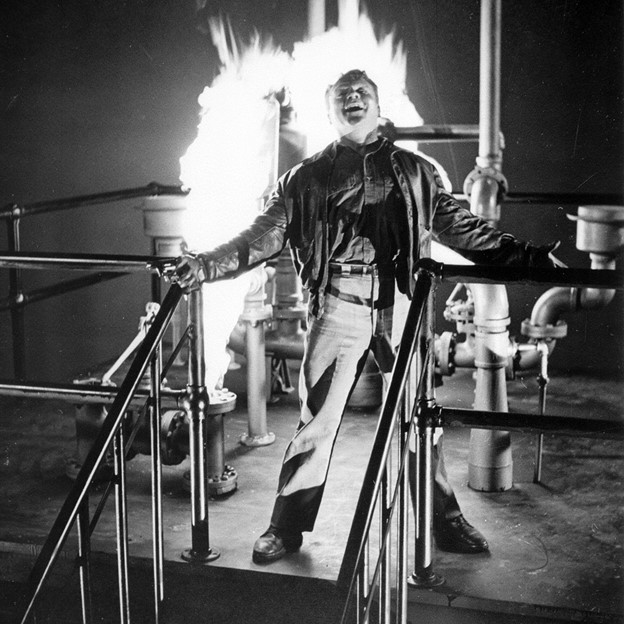White Heat (1949)
Raoul Walsh's "White Heat"
After appearing in many various gangster films in the 1930s, the start of the 1940s meant a fresh start for actor James Cagney. It started off pretty well, in fact, as Cagney won an Academy Award for his portrayal in Michael Curtiz's 1942 hit "Yankee Doodle Dandy." After this pinnacle of success, Cagney decided to start his own production company. This is where things got sour for Cagney, as he had a string of unsuccessful flops. By the late 1940s, Cagney's career was reaching a natural end. What he needed was a rejuvenation. The only way to rejuvenate Cagney's career was slipping back into the role of a gangster, a role which audiences had come to know from Cagney for the past two decades. Despite his conflicts with Jack Warner, Cagney signed on to do one last gangster film for Warner Brothers. The film was "White Heat" and the director was Raoul Walsh, who had also reached a natural ending point in his career. For both Cagney and Walsh, "White Heat" was to become their last great success. Not only this, it was to become the last great gangster film of the classic Hollywood era.
The film's protagonist, Cody Jarrett, is an insane and ruthless leader of a gang of thieves. He is afflicted with terrible headaches and has a professional relationship with his mother. After Jarrett gets arrested, one of the members of his gang hatches a plan to have him killed in prison so as to take over in his place. He even goes as far to kill Jarrett's mother, with the help of Jarrett's betraying wife. After escaping prison with he help of an undercover cop, Jarrett enacts revenge on his betrayers before finally getting caught by the police robbing a chemical plant. There, Jarrett commits an act of self-destruction as he sets the plant ablaze, with himself caught in the flames.
By 1949, gangster films had more or less been replaced with the slicker 'film noirs.' The ruff-and-tumble nature of gangster films were substituted for the more polished, morally complex, and structurally proficient crime thrillers. It had been well over 15 years since the hay-day of the gangster flick. So, "White Heat" was certainly a film out of its time. Because of this, the film almost seems to have a metatextual layer to it. A viewer in 1949 would have certainly been aware of the 'coming-to-an-end' element of the gangster genre. On top of that, the 'coming-to-an-end' element of Cagney and Walsh also attributed to the film's unique feel. This 'coming-to-an-end' aspect would almost certainly lend itself to melancholy for any typical film style. With the gangster film, however, and specifically with "White Heat," this element certainly turned more explosive. Throughout the entire film, it feels as though everyone is against Cody Jarrett. The police, his accomplices, his wife, everyone he talks to in prison, and everyone he comes into contact with in the film are all scheming to bring about his downfall, all except his loving mother, of course. As this point becomes evident as the film progress, it feels as though you're watching a pot boil. The heat continues to turn up and up, knowing eventually there will be a massive release. You know that every interaction, every decision, and every person is leading to not only Jarrett's downfall, but his fiery wrath. This explosive ending does finally come, when Jarrett is being shot at by police in the chemical factory. Jarrett opens fire on an flammable canister, leading to explosions and flame engulfing him. This explosive death, along with Cagney's iconic lines "Made it ma! Top of the world!" become the most memorable aspects of the film. The tension, the scheming, and the slow drive towards finality all arrive to an incredibly memorable ending, a shrieking eruption that correlates to the ending of one of Hollywood's most foundational genres. It also marked the end of Cagney and Walsh, symbolically kicking and screaming as they bid farewell.




Comments
Post a Comment